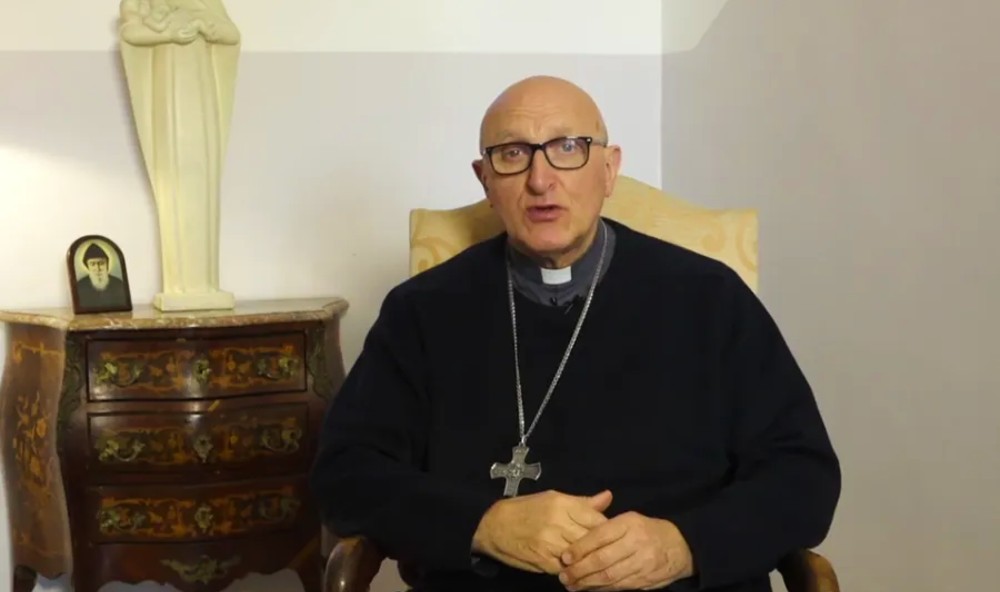We ask you, urgently: don’t scroll past this
Dear readers, Catholic Online was de-platformed by Shopify for our pro-life beliefs. They shut down our Catholic Online, Catholic Online School, Prayer Candles, and Catholic Online Learning Resources—essential faith tools serving over 1.4 million students and millions of families worldwide. Our founders, now in their 70's, just gave their entire life savings to protect this mission. But fewer than 2% of readers donate. If everyone gave just $5, the cost of a coffee, we could rebuild stronger and keep Catholic education free for all. Stand with us in faith. Thank you.Help Now >
Director of Vatican Press Office for the Holy See On the Impact of Pope's Trip to Lebanon
FREE Catholic Classes
He is Peter who encourages us and reinforces the foundations of the Faith for Christians. He has come to confirm all Catholics, all Christians, in their Faith and in their hope - particularly in their hope. That is what he has done. He has not given specific solutions to specific problems.
Highlights
Vatican Radio (www.oecumene.radiovaticana.org/EN1/index.asp)
9/17/2012 (1 decade ago)
Published in Middle East
Keywords: Fr Lombardi, Lebanon, Vatican Press Office, Vatican Radio, Pope Benedict XVI
P>VATICAN CITY (Vatican Radio) - Jesuit Father Federico Lombardi, Director of the Holy See Press Office, answers some pressing questions put to him by Vatican Radio's Tracey McClure, as Pope Benedict wrapped up his 3-day Apostolic journey to Lebanon.
Q: First, as the Holy Father prepares to leave Lebanon Sunday, could you give us your impressions of the trip?
A: My impression is obviously very positive, especially if I compare it with the attitude with which I came. I was worried: will the Pope succeed in giving his message? Will people listen to him? Now we have positive answers to all these questions. What we have seen here in Beirut, in Lebanon, was a wonderful encounter between the Pope and the Lebanese, different parts of this complex society, Catholics of different rites, but also Muslims of different communities.
The presence of the President of the Republic at all public moments of this trip, was a sign of the participation of the entire land in this historical visit. I think the Pope was right to come, and with courage, and to say "Yes, I am a pilgrim of peace and my presence will signify that we don't fear what happens around us, we announce the love of God: peace for all men and women of the world".
Q: In his Homily on Sunday's Gospel in which Jesus is on his way to Jerusalem, Pope Benedict said that episode marked a turning point in Jesus's life. In a certain sense, the Middle East is also marking a turning point today. - What was Pope Benedict inviting Christians here to do?
A: The Pope has given encouragement, he has confirmed principles we already knew, he has not provided new words or new solutions. But this is not his duty. He is Peter who encourages us and reinforces the foundations of the Faith for Christians. He has come to confirm all Catholics, all Christians, in their Faith and in their hope - particularly in their hope. That is what he has done. He has not given specific solutions to specific problems.
The document he leaves here, the Post-Synodal Apostolic Exhortation, is an important basis for reflection and discernment for the Christian communities to seek concrete measures and solutions to their pastoral problems. It offers a way for them to engage themselves in the life of society, and so on. There are many concrete things to do, but these are more the responsibility of the local communities and of the local faithful. The Pope gives directions, and encouragement for all. Work now begins to translate the document into action and into concrete solutions for the many problems.
Q: Sometimes the Church in the Middle East is seen as being somewhat distant from the lay faithful and young people. At the youth gathering Saturday in Bkirki asked for more help from church leaders to aid them in staying in these lands. How is the Church in Rome cooperating with churches here in that sense?
A: I think we cannot take responsibility away from those who have responsibility. That is really the local communities, the Catholic communities of the different rites, they have to find a way. The Pope said yesterday evening to the Patriarchs and the Bishops: please work well on catechesis, that is, on educating young people in the Faith, and adults too, because that's what they need. The Faith has to be something that engages reason, the heart, the mind, and the entire person. But you have to help people by educating them and catechesis is important.
In this regard, the Pope returned to the theme of the Year of Faith as an occasion to involve the entire community and the Church in this direction. And internationally, we have to seek concrete initiatives of solidarity. I know many local Churches in Italy too that are engaged in collaborative efforts with local communities in the Holy Land, in Lebanon, and in other parts of the world. It is not a question of centralising the organization of assistance, but it's a question of concrete solidarity between different local communities in different parts of the world - and it can be very effective because it means more to people than big principles or declarations.
Q: Pope Benedict made an appeal for Syria - one of many times he has called for an end to the violence there. How heavily does this tragic conflict weigh on the Holy Father, and indeed, all of the recent violence we've seen across the region?
A: The conflicts and deaths touch the Holy Father, and everyone else, very profoundly. Sometimes we don't see a solution, and no one until now has found a solution to the Syrian problem. We try to do what each of us can: sometimes through prayer, sometimes giving advice, and sometimes through appeals. The Pope has also said we must stop the arms trade and the importation of weapons. He continuously invites people to dialogue because Christians, not only in Syria but throughout the Middle East, are in a position to mediate, in a certain sense, because they are not a power that people fear, they are a minority.
Christians have no influence over weapons and power. In this sense they can invite the different sides in the conflict to come together and dialogue, to understand each other and to reconciliation. This is one of the aspects of the vocation of the Christian communities in the Middle East and this also regards the Christians in Syria. But we don't have concrete solutions for all these problems. I also think the Christians who came here from Syria during these days, felt the love of the Pope. His presence has encouraged them in this difficult time.
Q: Speaking at his Angelus on Sunday the Pope called on Arab countries andon the Iinternational Community to intervene to somehow stop the violence.
A: This is obvious because we know that conflicts in one country often reflect conflicts elsewhere, among major powers and nations with their specific interests. In this sense, the will of the entire international community to go in the direction of peace will also surely help extinguish tensions in different countries.
---
The Voice of the Pope and the Church in dialogue with the World
Join the Movement
When you sign up below, you don't just join an email list - you're joining an entire movement for Free world class Catholic education.
-

-
Mysteries of the Rosary
-
St. Faustina Kowalska
-
Litany of the Blessed Virgin Mary
-
Saint of the Day for Wednesday, Oct 4th, 2023
-
Popular Saints
-
St. Francis of Assisi
-
Bible
-
Female / Women Saints
-
7 Morning Prayers you need to get your day started with God
-
Litany of the Blessed Virgin Mary
Meta's New Commitment to Free Speech and Its Potential Impact on Online Discourse
-

Pope Francis Accepts Resignation of Bishop Dominique Rey of Frejus-Toulon
-

Bound by Betrayal: Katie's Struggle with Lust, Lies, and Redemption
-
John: A Story of Addiction, Hopelessness, and the Search for Redemption
-
Science vs. Faith: The Battle for Truth and Hope
Daily Catholic
 Daily Readings for Wednesday, January 08, 2025
Daily Readings for Wednesday, January 08, 2025 St. Thorfinn: Saint of the Day for Wednesday, January 08, 2025
St. Thorfinn: Saint of the Day for Wednesday, January 08, 2025 Prayer for a Blessing on the New Year: Prayer of the Day for Tuesday, December 31, 2024
Prayer for a Blessing on the New Year: Prayer of the Day for Tuesday, December 31, 2024- Daily Readings for Tuesday, January 07, 2025
- St. Raymond of Pennafort: Saint of the Day for Tuesday, January 07, 2025
- St. Theresa of the Child Jesus: Prayer of the Day for Monday, December 30, 2024
![]()
Copyright 2024 Catholic Online. All materials contained on this site, whether written, audible or visual are the exclusive property of Catholic Online and are protected under U.S. and International copyright laws, © Copyright 2024 Catholic Online. Any unauthorized use, without prior written consent of Catholic Online is strictly forbidden and prohibited.
Catholic Online is a Project of Your Catholic Voice Foundation, a Not-for-Profit Corporation. Your Catholic Voice Foundation has been granted a recognition of tax exemption under Section 501(c)(3) of the Internal Revenue Code. Federal Tax Identification Number: 81-0596847. Your gift is tax-deductible as allowed by law.






 Daily Readings for Wednesday, January 08, 2025
Daily Readings for Wednesday, January 08, 2025 St. Thorfinn: Saint of the Day for Wednesday, January 08, 2025
St. Thorfinn: Saint of the Day for Wednesday, January 08, 2025 Prayer for a Blessing on the New Year: Prayer of the Day for Tuesday, December 31, 2024
Prayer for a Blessing on the New Year: Prayer of the Day for Tuesday, December 31, 2024


